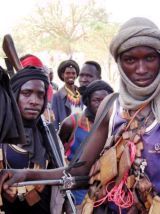US now sees Darfur rebels as part of the problem
Oct 17, 2005 (WASHINGTON) — The United States is growing increasingly critical of rebel forces in Sudan’s Darfur region – to the point where Washington is holding the rebels and government-allied militias equally responsible for the continued violence in Darfur.
 A State Department spokesman last week explicitly blamed two groups – the Sudan Liberation Movement and a faction of the rival Justice and Equality Movement – for attacks on African Union (AU) peacekeepers in Darfur.
A State Department spokesman last week explicitly blamed two groups – the Sudan Liberation Movement and a faction of the rival Justice and Equality Movement – for attacks on African Union (AU) peacekeepers in Darfur.
The spokesman, Adam Ereli, said the United States “strongly condemns” the kidnapping of AU personnel on October 9 and the killing a day earlier of four members of an AU detachment.
The abduction of 36 AU monitors, including one American, was attributed to the Justice and Equality Movement. The hostages were later released unharmed.
The Sudan Liberation Movement, the larger of the two Darfur rebel groups, was meanwhile accused of the October 8 ambush that took the lives of two Nigerian soldiers as well as two Sudanese drivers attached to an AU unit in southern Darfur.
Those were the first fatalities suffered by the AU peacekeeping force since its deployment to Darfur in April 2004.
“Violence will not bolster the negotiating position of any party in the Abuja peace talks, will not earn any group enhanced contacts with the United States and will not gain any faction a seat at the negotiating table,” Mr Ereli said in a statement on October 10.
Two days later, the State Department spokesman again criticised the rebel groups. Mr Ereli said the United States has told both the government of Sudan and the rebels that acts of violence in Darfur “are unacceptable to us, and they have to stop.”
The conflict between the rebels and the pro-government Janjaweed militias “has gone on for far too long,” Mr Ereli added, saying “it is an incumbent on all sides to take actions” to promote peace in Darfur.
Jendayi Frazer, the assistant secretary of state for African Affairs, is scheduled to travel to Darfur and to Khartoum on October 20 and 23 when she will presumably reiterate US demands on both the rebels and the Sudan government.
US denunciation of rebel violence should be seen more as a shift in tone than a change of policy, the US had never expressed support for the rebellion in Darfur.
“We hold no brief with the rebels,” a senior State Department official told reporters more than a year ago. “Their political positions are not particularly attractive to us.”
American policy in regard to the Darfur conflict thus differs markedly from Washington’s position on the separate rebellion that raged for many years in southern Sudan. There, the US clearly sympathised with the rebel forces led by John Garang, although the State Department did occasionally criticise the southern Sudan guerrillas.
Until recently, the Bush administration took the position that the Sudan government and its allied militias were almost entirely to blame for the violence in Darfur, which has resulted in an estimated 300,000 deaths.
In fact, top US officials, including President Bush, have said that forces aligned with Khartoum are carrying out genocide in Darfur.
But Washington’s rhetoric has changed in the past few weeks. While continuing to fault the Janjaweed forces and their sponsors in Khartoum, the US is openly expressing exasperation with the rebel groups. This shift in emphasis coincides with a worsening rift within the rebels’ own ranks.
“Unless reversed, the slow implosion of the rebel movements threatens to extend the tragic situation in Darfur indefinitely,” the Brussels-based International Crisis Group (ICG) warned last week.
The Sudan Liberation Movement (SLM) is split into two factions, each of which insists it controls a majority of the group’s fighters, the ICG report says. The Justice and Equality Movement, described as militarily inferior, has meanwhile been engaged in firefights with the less stringently Islamist SLM, according to the Crisis Group.
The splintering of rebel forces would probably not result in an end to hostilities in Darfur but would instead likely lead to “the prevalence of warlordism throughout Darfur and make a political solution to the crisis impossible,” the ICG said in a report.
In addition, the Khartoum government can be expected to try to take advantage of divisions among rebels, further reducing the chances of a successful outcome of the Abuja talks, the report observes.
The International Crisis Group is a non-governmental organisation that analyses conflicts throughout the developing world. With a significant portion of its funding coming from Western governments, the ICG is seen as offering insights into the thinking of officials in Europe and the US.
The report terms the SLM “increasingly an obstacle to peace.” Divisions among SLM political leaders and its clashes with the Justice and Equality Movement “have undermined the peace talks and raised questions about its legitimacy,” the report says.
(The EastAfrican)
